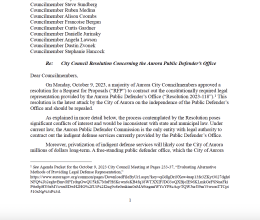In this case, ACLU attorneys challenged an Englewood ordinance that makes it a crime for registered sex offenders to live within 2000 feet of any school, park, or playground, or 1000 feet of any licensed day care center, recreation center or swimming pool. As a practical matter, the ordinance bans previously-convicted sex offenders from living in the city.
The ACLU’s client, Brett Ryals, was unaware of the ordinance when he bought a home in Englewood in 2012. He had already served a sentence from his 2001 felony conviction. He had participated in state-mandated treatment and rehabilitation. He had been supervised by state authorities for years until he was deemed safe and released from parole. When he complied with his legal obligation to register his new residence with the Englewood police, he was charged with violating the residency restriction, a misdemeanor.
The prosecution of Mr. Ryals was stayed while the ACLU’s civil lawsuit challenging the ordinance proceeded. ACLU attorneys filed the lawsuit in state court, asserting that the Englewood ordinance is an unconstitutional ex post facto law, violates due process, and is preempted by the Colorado Constitution. Englewood removed the case to federal district court. After a trial, Judge Jackson ruled that the ordinance exceeded Englewood's home rule powers and was preempted by the Colorado Constitution. Ryals v. City of Englewood, 962 S.Supp.2d 1236 (D. Colo. 2013). Englewood appealed to the Tenth Circuit, which sent the controlling state-law question to the Colorado Supreme Court. That court ruled against Ryals in 2016. Ryals v. City of Englewood, 364 P.2d 900 (Colo. 2016).
Media:
-
“Englewood sex offender residency restrictions ruled unconstitutional,” KDVR.com, August 22, 2013
-
“U.S. judge overturns Colorado city's sex offender residency law,” Reuters, August 22, 2013
-
“Englewood to appeal ruling on sex offender residency restrictions,” KDVR.com, August 27, 2013
-
“Sex offender residency restrictions being scaled back,” The Denver Post, May 4, 2014
ACLU case number
2010-04
